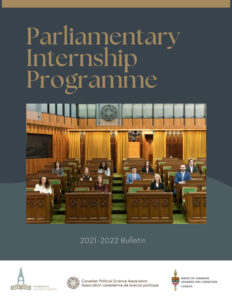What is the Parliamentary Internship Programme?
Envisioned by backbench Member of Parliament (MP) Alfred Hales in 1969, the non-partisan Parliamentary Internship Programme (PIP) creates unique training opportunities for young professionals and recent university graduates, increases knowledge of Parliament, and provides MPs with skilled assistants.
During their ten-month tenure, interns shadow MPs to learn firsthand about the work that goes on in the House. They write speeches, briefing notes, research reports, and questions for question period. They visit their MPs’ ridings, author innovative research papers on Parliament and the work of MPs, and take part in legislative study tours within Canada and abroad. These internships are full-time, paid positions.
Since 1970, PIP has supported over 500 young Canadians and assisted hundreds of MPs. The growing community of PIP alumni includes academics, politicians, senior government officials, diplomats, journalists, union leaders, judges and leaders in industry and the non-profit sector. Their pooled experience and shared commitment to research and education create a special opportunity.

The PIP Blues
At the House of Commons, the term “Blues” refers to the draft, unedited transcripts of House debates that were at one time published on blue paper to distinguish them from the final copy.
The PIP “Blues” is a newsletter published each winter that provides a snapshot of all that the Interns have achieved in the first half of their time on the Hill.
A Day in the Life of a Parliamentary Intern
It’s 7:00 am and your alarm blares–time to chug some coffee and peruse the latest headlines to get ready for another day on Parliament Hill.
Your day officially begins at 8:30 am with an early committee meeting for your Member of Parliament in Centre Block. After a quick hello to the friendly security guards, you flash your pass and scurry on to the committee room. You sit with the other legislative assistants and listen intently as the committee debates an international trade issue you briefed your MP on the day before.When it comes to your MP’s turn to question the witness, they use the research you prepared and the questions you wrote!
By 10:30 committee is over and back in the office you start checking your emails but before you get very far, you receive a call from the constituency office about an immigration case file you have been working on. Time flies by and all of a sudden it is 11:50 so you speed walk across the Parliamentary Precinct to the Brown Bag Lunch your fellow interns organized with a famous journalist. One of her comments sparks an idea for your research paper so you jot down her contact information for later and head back to your office.
You check your inbox and just as you start responding to an email, your MP’s legislative assistant pops his head around the corner–the Member has a meeting with a lobby group in ten minutes–do you want to sit in? You grab your notebook and head into the meeting to take notes and photos for your MP’s social media account. Tomorrow, you will file the notes you took and write a follow-up letter to the group about their policy concerns.
You spend the rest of the afternoon answering emails and writing a speech about health policy that your MP will deliver the next day in the House of Commons during debate. All of a sudden it’s 5:30 pm, so it’s time to head to a reception. While at the reception, you speak with the British High Commissioner about your upcoming study tour to the United Kingdom. You chat with other staffers and interns you know from around the Hill and speculate about what tomorrow’s hot topic will be in Question Period tomorrow.
At 7:00 pm it’s finally time to head home, walking part way with a fellow intern who lives nearby. You debate the pros and cons of the Private Members Bill lottery system and wave goodbye at Bronson Avenue. Just another day on the Hill!

